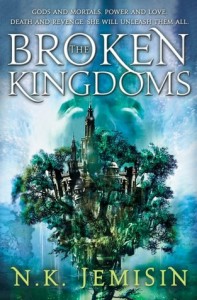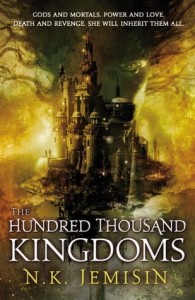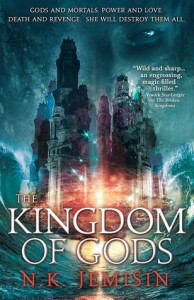Blind But Unbroken
 The Broken Kingdoms is the second in N.K. Jemisin's The Inheritance Trilogy. I found the first one, The Hundred Thousand Kingdoms, well-written and intriguing, so I went ahead and picked up the sequel, and lo and behold, I found another disabled character to talk about. I've got a whole list of books to read because someone somewhere has said they have something to do with disabilities, but I really love discovering them on my own. It's like turning over rocks to find bugs, only a lot less squirmy and squishy.
Oree Shoth, the protagonist, has been blind since birth. She can “see” magic, but that doesn't really help her on a day-to-day basis. To me, it didn't feel like Jemisin had an agenda for writing a character who's blind. The disability was just a part of the whole, something that added another dimension to who Oree was. I really admire an author who can take an impairment that affects all aspects of life and treat it as just another character trait. It makes disabilities feel a lot more normal – see, I'm really not all that different from everyone else – and it helps everyone else see disabilities in a different, more intimate way.
The Broken Kingdoms is the second in N.K. Jemisin's The Inheritance Trilogy. I found the first one, The Hundred Thousand Kingdoms, well-written and intriguing, so I went ahead and picked up the sequel, and lo and behold, I found another disabled character to talk about. I've got a whole list of books to read because someone somewhere has said they have something to do with disabilities, but I really love discovering them on my own. It's like turning over rocks to find bugs, only a lot less squirmy and squishy.
Oree Shoth, the protagonist, has been blind since birth. She can “see” magic, but that doesn't really help her on a day-to-day basis. To me, it didn't feel like Jemisin had an agenda for writing a character who's blind. The disability was just a part of the whole, something that added another dimension to who Oree was. I really admire an author who can take an impairment that affects all aspects of life and treat it as just another character trait. It makes disabilities feel a lot more normal – see, I'm really not all that different from everyone else – and it helps everyone else see disabilities in a different, more intimate way.
Now, I'm not blind, so I don't have any experience to compare Oree with, but  from my limited perspective, the details Jemisin provided seemed pretty consistent and thought-provoking. Oree always recognized people by scent or sound rather than physical characteristics she couldn't see. She could tell plants and pigments apart just by touch or smell. And Jemisin did something really cool to highlight Oree's different perspective. There were moments in the book where there was so much magic around her that Oree could actually see, and she marvels at the experience. Things that never would have crossed my mind became the defining details of her narrative. She wonders at things like depth perception, the way her eyes try to focus, and how her hands look. She did do the stereotypical face feeling, and I've heard several people who are blind scoff at this, saying, “No, I don't want to feel your face. Do you want to feel mine?” Oree does it more to tell what emotions people are feeling, but I still wasn't buying it.
from my limited perspective, the details Jemisin provided seemed pretty consistent and thought-provoking. Oree always recognized people by scent or sound rather than physical characteristics she couldn't see. She could tell plants and pigments apart just by touch or smell. And Jemisin did something really cool to highlight Oree's different perspective. There were moments in the book where there was so much magic around her that Oree could actually see, and she marvels at the experience. Things that never would have crossed my mind became the defining details of her narrative. She wonders at things like depth perception, the way her eyes try to focus, and how her hands look. She did do the stereotypical face feeling, and I've heard several people who are blind scoff at this, saying, “No, I don't want to feel your face. Do you want to feel mine?” Oree does it more to tell what emotions people are feeling, but I still wasn't buying it.
Oree really values her freedom and independence. She uses tools and has a routine that allows her to live and work independently. She fights for her freedom and chafes when it's taken away. However, she recognizes that it's okay to need help occasionally. I loved watching as Oree struggled to teach this balance to another character. Maybe because I was almost as stubborn as he was about accepting this simple life lesson. No one can do everything, except maybe Superman, and who wants to be him? Have you ever tried changing in a phone booth? Though I'll admit the flying thing is certainly tempting. Whatever, my point is that I can ask for help without sacrificing anything of myself or my pride.
 And Oree had a really subtle strength. There were plenty of moments where she seemed weak, where she accepts all she can do is run away, but when it finally came down to the line there was no one else to pick up the slack, she stepped up and saved the day. There's something about that kind of hero that appeals to everyone, I think. Not all of us are capable of being the big, blond guy with the stainless armor and sword, and the smile that goes ting. Some of us are more like Oree, bruised and bowed, but unbroken, with a subtle heroism if you're willing to look beneath the surface.
And Oree had a really subtle strength. There were plenty of moments where she seemed weak, where she accepts all she can do is run away, but when it finally came down to the line there was no one else to pick up the slack, she stepped up and saved the day. There's something about that kind of hero that appeals to everyone, I think. Not all of us are capable of being the big, blond guy with the stainless armor and sword, and the smile that goes ting. Some of us are more like Oree, bruised and bowed, but unbroken, with a subtle heroism if you're willing to look beneath the surface.
Yeine and Oree's stories might be done, but the trilogy concludes with The Kingdom of Gods.
